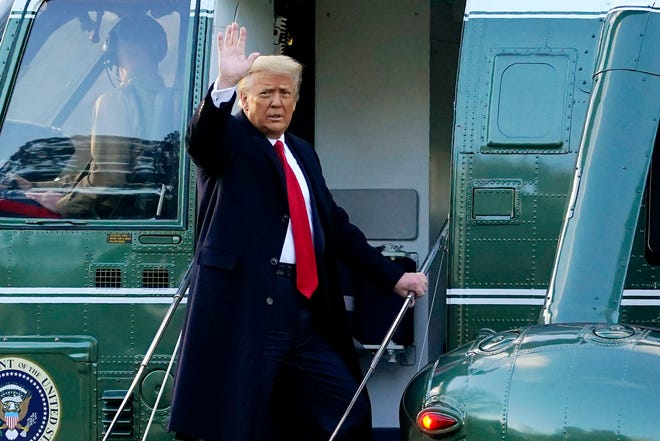
This article is more than
4 year old
WASHINGTON – Now-former President Donald Trump may have had about 89 million followers on Twitter before the platform suspended his account, but the Supreme Court apparently isn't interested in how he got along –or didn't–with some of them.
The justices on Monday dismissed as moot a high-profile case about whether Trump was on solid legal ground when he blocked several of his critics on his once-favorite social media website. A federal appeals court ruling found Trump's actions violated the First Amendment, and the court tossed that decision.
Both sides in the suit had agreed the case is moot since Trump is no longer president and no longer has access to Twitter. The company permanently suspended his account in January following the riot at the U.S. Capitol that took place following a rally the then-president held near the White House.
But the Twitter users that had been blocked had nevertheless asked the court to leave the ruling in place as a guidepost for future government officials.
"This case was about a very simple principle that is foundational to our democracy: Public officials can’t bar people from public forums simply because they disagree with them," said Jameel Jaffer, executive director of the Knight First Amendment Institute, which represented the blocked users.
“While we would have liked the Supreme Court to leave the Second Circuit’s ruling on the books, we’re gratified that the appeals court’s reasoning has already been adopted by other courts, and we’re confident it will continue to shape the way that public officials use social media," Jaffer said.
A Trump aide did not immediately respond to a request for comment.
The Supreme Court did not issue an opinion. Justice Clarence Thomas, however, wrote a concurring opinion raising broader questions."Applying old doctrines to new digital platforms is rarely straightforward," Thomas wrote. "Respondents have a point, for example, that some aspects of Mr. Trump’s account resemble a constitutionally protected public forum. But it seems rather odd to say that something is a government forum when a private company has unrestricted authority to do away with it."
Trump invited the court battle in 2017 by blocking some Twitter users from following his popular account, @realDonaldTrump. Blocked users can't read tweets, respond to them directly, or contribute to the comment threads. Seven users went to court, charging that Trumpwas seeking to "suppress dissent."
A federal district court ruled against him in 2018, and a panel of the U.S. Court of Appeals for the 2nd Circuit followed suit in 2019. In 2020, the full appeals court declined to rehear the case.
"These tweets are published by a public official clothed with the authority of the state using social media as a tool of governance and as an official channel of communication on an interactive public platform," appeals court Judge Barrington Parker wrote.
Then-Acting Solicitor General Jeffrey Wall, who left the post when President Joe Biden took office, had urged the justices to take up Trump's appeal. He notedthe Twitter account was created in 2009 when Trump was a private citizen and lived on as a source of both personal and official pronouncements.
"The president uses his account to speak to the public, not to give members of the public a forum to speak to him and among themselves," Wall wrote."Denying him the power to exclude third parties’ accounts from his personal account – a power that every other owner of a Twitter account possesses – would deter holders of his office from using new technology to efficiently communicate to a broad public audience."

Trump tweeted regularly from the @realDonaldTrump account, sometimes more than 100 times a day. Since establishing the account, he had tweeted more than 58,000 times – an average of about 14 per day. Typical of late were his baseless allegations of election fraud, a theme he began following President Barack Obama's re-election in 2012 and amplified after losing to Biden. The Trump White House tweeted less often from the @POTUS account, an account that belongs to the U.S. government rather than Trump and which has been transferred to the Biden administration.
Tweet:Trump permanently banned from Twitter over risk he could incite violence
The Justice Department acknowledged that Trump had used the @realDonaldTrump account for government business but said the appeals court failed to understand that blocking followers is his personal decision.
"By ignoring the critical distinction between the president’s (sometimes) official statements on Twitter and his always personal decision to block respondents from his own account, the opinion blurs the line between state action and private conduct," Wall had said in asking the Supreme Court to hear the case.
More:Trump's defeat may give Supreme Court a rest from personal, policy lawsuits
One of the seven Twitter users who brought the case in 2017 was Rebecca Buckwalter of Washington, D.C. After Trump tweeted, "Sorry folks, but if I would have relied on the Fake News of CNN, NBC, ABC, CBS washpost or nytimes, I would have had ZERO chance winning WH,” she replied: “To be fair you didn’t win the WH: Russia won it for you.”
After the 2018 district court ruling, the White House unblocked the seven people who brought the case, along with others blocked because of their viewpoints. But it did not unblock those who could not specify the tweet that caused Trump to block them, or those blocked before he became president.